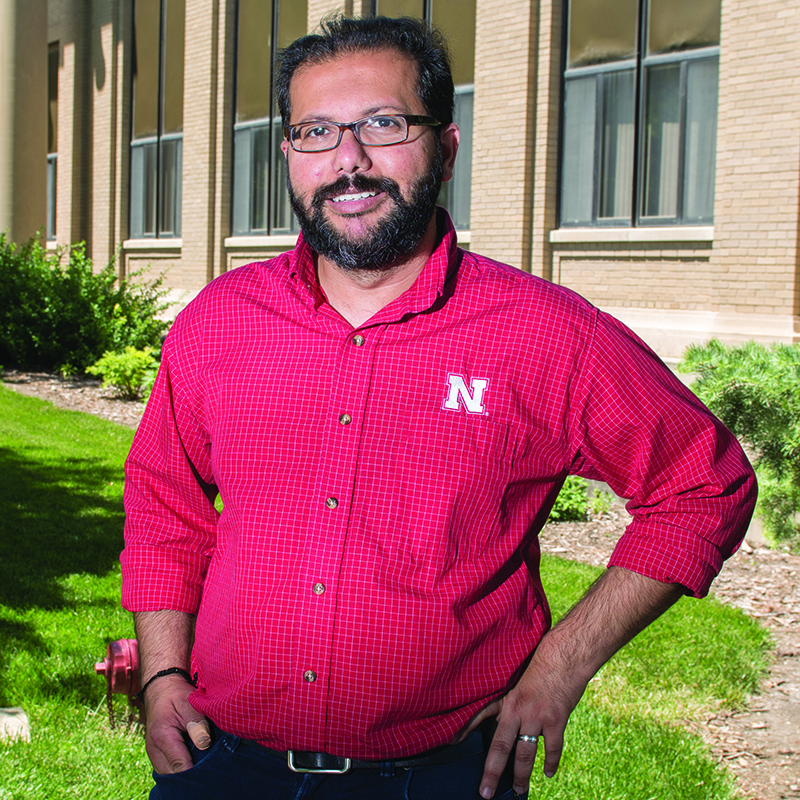
Developing Learners While Building Leaders
“I think everybody deserves the chance to have their story be a good one. As an educator, if I can help in that story-writing process, I think that’s a win for me. I feel like I’ve made a difference.”
Deepak Keshwani, associate professor of biological systems engineering at the University of Nebraska–Lincoln, helps to ensure the success of each student through research and teaching. Keshwani earned his Bachelor of Science degree in biological systems engineering and Master of Science in agricultural and biological systems engineering at the university. He then went on to North Carolina State University for his doctorate in biological and agricultural engineering before returning to teach and research at the University of Nebraska–Lincoln.
As a biological systems engineer by training, Keshwani develops models to help better understand biological systems, predict what might happen in different situations and be able to control the systems.
FROM LAB TO LESSONS
Keshwani links his research to topics his class is learning. He said this method helps students see the value of the topic and how people will use the information. It then also allows him to talk about his research in an accessible manner to his students.
Outside of research and teaching, Keshwani coordinates the Ag Futures: Entrepreneurship, Leadership & Service first-year learning community and serves as the faculty adviser. The learning community connects first-year students who live on the same dormitory floor and take similar courses, while the faculty adviser helps them adjust to college. Keshwani sees educational inequality translating into students’ academic careers, whether it be a lack of knowledge, lack of awareness of a certain career path, or preconceived notions that students have about themselves.
One of the strategies Keshwani uses during the first semester is to have students explore their chosen majors and explore what the major entails. He brings alumni or students who have completed internships to speak with his students. He has each student explore his or her degree program and build a four-year course plan. He then encourages his students to set goals for themselves and really understand what their personal, academic and professional paths are for the next four years. These goals are then written out and kept for both him and the student to reference.
BUILDING LEADERS
“If you really want to effectively engage with people, you need to understand a little bit about yourself,” Keshwani said. He challenges students to think about what they are interested in, and why they are drawn to different issues. This requires them to think about themselves and create a sense of self-awareness, which he believes helps build confidence.
“I work really hard to try to empower my students to realize that they’re in control,” he said. He wants to help give them confidence to make decisions while they are in the safety net of college. “Taking a wrong turn is not the worst thing. The worst thing is not taking a turn at all.” He said one of his mentors said it’s not about what’s being taught, it’s what’s being learned by the students and with that mentality he tailors all his lessons to his students.
Helping students maximize their potential is a goal Keshwani has from his experience at the university. Many of the professors he had as a student at the university still mentor him. They helped him realize the impact that a professor can have on a student, and he desires to do the same.
BEYOND THE COLLEGIATE EXPERIENCE
The College of Agricultural Sciences and Natural Resources’ tagline is “Science with a purpose.” Keshwani believes that by taking an active role in each student’s growth he’s able to empower students to take what they’re learning in the classroom to go out into the world. He wants students to recognize the responsibility they have of being ambassadors for the university and caretakers of the knowledge base they acquire, which means helping people in their communities and solving problems within society.
Keshwani wants every student he interacts with to have the benefit of his attention. For him, measuring success is based on his interactions with others. He asks, “Did my interaction move the needle forward? Did it elevate a conversation? Was I able to help somebody toward a better place?” One of Keshwani’s mentors told him that “our students will move mountains. We just have to equip them, and they’ll do it.”